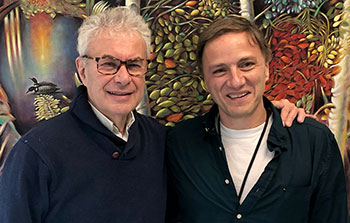St. Michael’s inaugural Scholar-in-Residence kicks off international collaboration within our walls

By Ana Gajic
Dr. Marcelo Amato, a critical care scientist at the University of São Paulo in Brazil, is the first-ever Arthur S. Slutsky Scholar-in-Residence (SIR) at the Keenan Research Centre for Biomedical Science.
After world-renowned critical care researcher Dr. Art Slutsky stepped down as the Vice-President of Research in 2018, the St. Michael’s Hospital Foundation helped establish the SIR program. This program honours an internationally known scientist who will work in residence at St. Michael’s, providing research consultancy, mentorship and expertise to its scientists, staff members and trainees that will last beyond the period that the scholar is in Toronto.
Dr. Amato will be leading a collaboration between his lab in Brazil and other laboratories at the Keenan including the labs of Dr. Laurent Brochard and Dr. Haibo Zhang. This collaboration will see Dr. Amato and some of his students travel between Toronto and Brazil to further international knowledge in critical care research.
He arrived for the first part of his placement last month and we sat down with him to learn more about his research, collaboration and opinions of Canadian winter.
What does your research focus on?
I work on innovative and low-cost solutions to improve respiratory care, especially during mechanical ventilation. This includes technological development, like respiratory monitoring techniques, with new clinical protocols for lung protection and improved gas exchange in critically ill patients. With the collaboration underway, we have been able to trial some of this innovation in patients at St. Michael’s.
Our long-term goal is to find solutions to further improve the outcome of critically ill patients.
Why were you interested in visiting St. Michael’s Hospital in particular as Scholar-in-Residence?
I was interested in this opportunity because of my admiration and partnership with the brilliant team of researchers and physicians working here over the last few years.
We have a long history of collaborative research and publications. The possibility of further leveraging this fruitful partnership is an exciting target. This could now involve a more direct exchange of trainees, researchers and knowledge between São Paulo and Toronto.
What are you hoping to gain from your experience at St. Michael’s?
Innovation in clinical research, especially the disruptive type, is based on unmeasurable aspects. To be innovative you need excitement, freedom to express opinions, different backgrounds of the fellows and of the research team, good attitudes to face the unexpected, and an innovative local academic culture to formulate new research questions. In sum, there are many unmeasurable elements needed that go beyond academic ranks like the number of publications of a certain institution. My hope is that I can absorb such unmeasurable aspects in this new environment at St. Michael’s.
What does it mean to you to be St. Michael’s inaugural Scholar-in-Residence?
This is an honour and a unique opportunity. I have known Dr. Art Slutsky for over two decades and I have been thinking about an opportunity to experience Toronto for a long time.
I have wanted to get to know the research-rich atmosphere of Toronto, especially at St. Michael’s, but never had the chance to make it happen because of timing, economical limitations, and also because of the lack of an academic opportunity for this. This opportunity has made it possible.
What has been most surprising to you since you started?
I’m not going to say anything about the weather – I was prepared for the cold, but not this cold!
The most surprising aspect apart from weather is the general attitude, which is much kinder than I was imagining. Beyond the researchers and the research building, people are very kind to each other. Even the way people interact on the street is generally nice, which has been pleasant.
I was also pleasantly surprised to find that people at St. Michael’s prioritize research, not bureaucracy. The processes are rigorous, and the focus is on research because it is understood that it will improve patient care.
What are you most looking forward to?
I would like to have these ideas and collaboration eventually result in improved outcomes for patients, and in the short term I’m hopeful it will result in some excellent published papers and ongoing collaboration. Time will be limited, but the opportunity is immense.
This story is one of many we’re highlighting to share discoveries and collaborations led by our Keenan Research Centre for Biomedical Science. The Keenan is home to basic science and translational research at Unity Health. Our researchers target common and high burden illnesses that are important to patients and strive to make discoveries that will improve patients’ lives. The Keenan: Driven by discovery. Share our stories using #TheKeenanDiscovery.
About St. Michael’s Hospital
St. Michael’s Hospital provides compassionate care to all who enter its doors. The hospital also provides outstanding medical education to future health care professionals in more than 27 academic disciplines. Critical care and trauma, heart disease, neurosurgery, diabetes, cancer care, care of the homeless and global health are among the Hospital’s recognized areas of expertise. Through the Keenan Research Centre and the Li Ka Shing International Healthcare Education Centre, which make up the Li Ka Shing Knowledge Institute, research and education at St. Michael’s Hospital are recognized and make an impact around the world. Founded in 1892, the hospital is fully affiliated with the University of Toronto.
About Unity Health Toronto
Unity Health Toronto, comprised of Providence Healthcare, St. Joseph’s Health Centre and St. Michael’s Hospital, works to advance the health of everyone in our urban communities and beyond. Our health network serves patients, residents and clients across the full spectrum of care, spanning primary care, secondary community care, tertiary and quaternary care services to post-acute through rehabilitation, palliative care and long-term care, while investing in world-class research and education. For more information, visit www.unityhealth.to.
